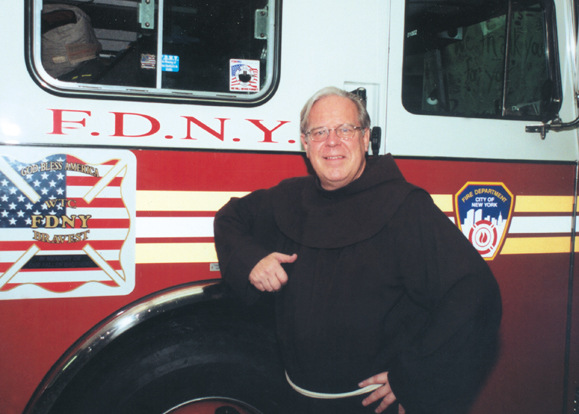Fr. Christopher Keenan, a Franciscan priest whose parents came from Co. Galway and Co. Roscommon, has been assigned the difficult task of replacing the much loved Fr. Mychal Judge as chaplain of the Fire Department. Fr. Judge, a fellow Franciscan and a friend of Fr. Keenan’s for 38 years, was killed on September 11 giving last rites to Fire Chief Bill Feehan. In his role as chaplain, Fr. Keenan will form part of an interfaith chaplaincy team made up of seven members including one Muslim, one Jewish and four other Christian chaplains.
Prior to September 11, his demanding schedule included working as “part of the Franciscan family trying to develop partnerships around issues of justice.” Fr. Keenan’s role in this program involved trying to help the 13,000 homeless children and their families throughout the five boroughs of New York. His duties also included church activities such as celebrating masses and hearing confessions at St. Francis of Assisi Church on West 31st Street near 7th Avenue. While Fr. Keenan is still involved in these duties, to which the Franciscans attach a high priority, he personally has less time to pursue them now that his role as fire chaplain has expanded from the part-time 20 hours a week role it was originally envisaged as being. Fr. Keenan explains that his Franciscan colleagues have been kind enough to allow him the time and freedom to pursue his valuable work with the Fire Department. “The staff felt that we owed a duty to the city to free me up to devote more time to the Fire Department, as Mychal was able to.”
Fr. Keenan describes the primary role of the chaplain before September 11 as being to respond to three-alarm fires (serious fires for which 3 alarms are rung) and to make hospital visits to injured firefighters. If a firefighter died, the chaplain would help with notifying the family and assist with funeral arrangements. Since September 11, the duties have changed substantially. He visits Ground Zero a couple of times a week and hears mass there, particularly on weekends. He visits the burn centers at NYU and Cornell Hospitals every weekend. He also visits the morgue and attends memorial services, funerals and wakes. He sees his role as not so much to offer spiritual guidance but rather to try to sort out problems and difficulties the firefighters might be experiencing. “When I look at them, it is unspoken, they just want me to be real with them, just to be there.”
If he can’t help the firefighters himself, he is happy to refer them to somebody who can and he emphasizes that emergency workers and paramedics are included as part of the Fire Department. He worries that some of the rescue workers will experience a unique kind of post-traumatic stress that is unquantifiable and which may not manifest itself for a while. “In the Pan-Am disaster in Lockerbie and in Oklahoma, firefighters and rescue workers went in after people they didn’t know, yet they still suffered post-traumatic stress. In New York, the firefighters were involved in the tragedy themselves and then went in to recover their brothers and friends as well as other people.”
He cautions that it is not just rescue workers who are at risk. “Over 30,000 people have been directly affected by September 11 and may experience difficulty coping,” he says and urges anybody with signs of post-traumatic stress to seek counseling. These warning signs are: feelings of anger, irritability or depression which are difficult to control; experiencing nightmares or traumatic dreams; an increased use of alcohol or drugs; and a desire to isolate oneself from family and/or friends.
Fr. Keenan identifies some of the incredible pressures faced by firefighters arising out of September 11: “343 `brothers’ are dead or missing and another 300 will never return to the Fire Department because of injuries they sustained on that day. They continue to do their job in the absence of their lost colleagues, do their shifts at Ground Zero, attend all the funerals and memorial services, and be surrogate fathers and support figures to families who lost members as well as looking after their own families. They will not be at peace until this is over — until every person who can be found is found.”
Despite these difficulties, he is optimistic about the future of the FDNY. Though they are dealing with “a grief that is beyond all griefs,” hope lies in their unique spirit.
“They all do whatever needs to be done…while they are devastated, they have an incredible way of life that will ultimately sustain them. They go out in the truck together to shop in a supermarket — sharing the expenses. They cook together and sleep in dormitories. They socialize outside the job and their families know one another. Everything they do has to be teamwork. Their lives depend on one another.”
For himself, Fr. Keenan feels that his exposure to “these incredible people” has helped transform his own anxiety and fear into serenity and peace. Despite having what he describes as “initial misgivings about stepping into Mychal’s shoes,” he decided to take the job. In doing so, he is following advice that he feels Mychal would have offered him: “Just be yourself, follow God’s will, enjoy these wonderful people as I did and take one day at a time.” ♦


Leave a Reply